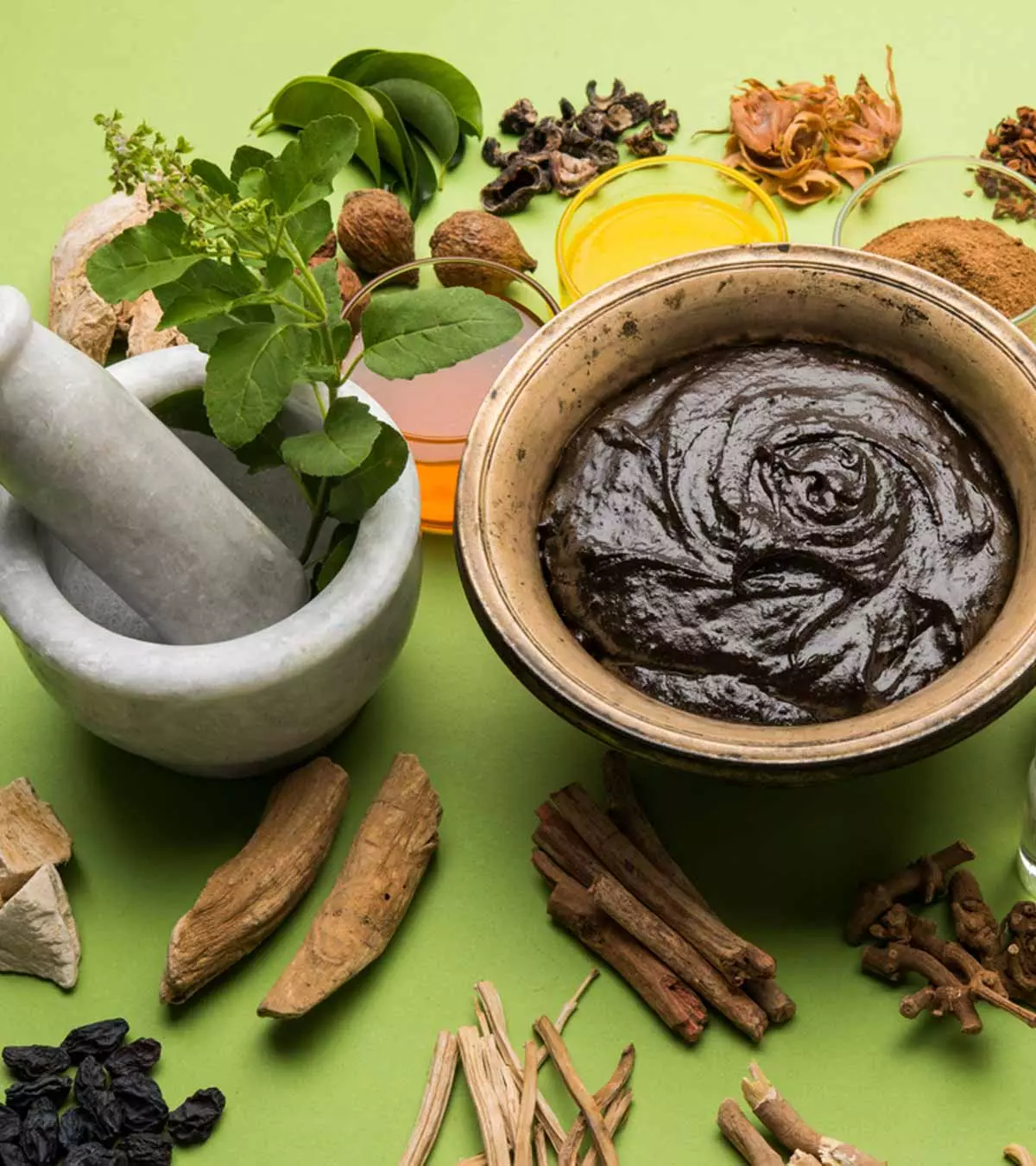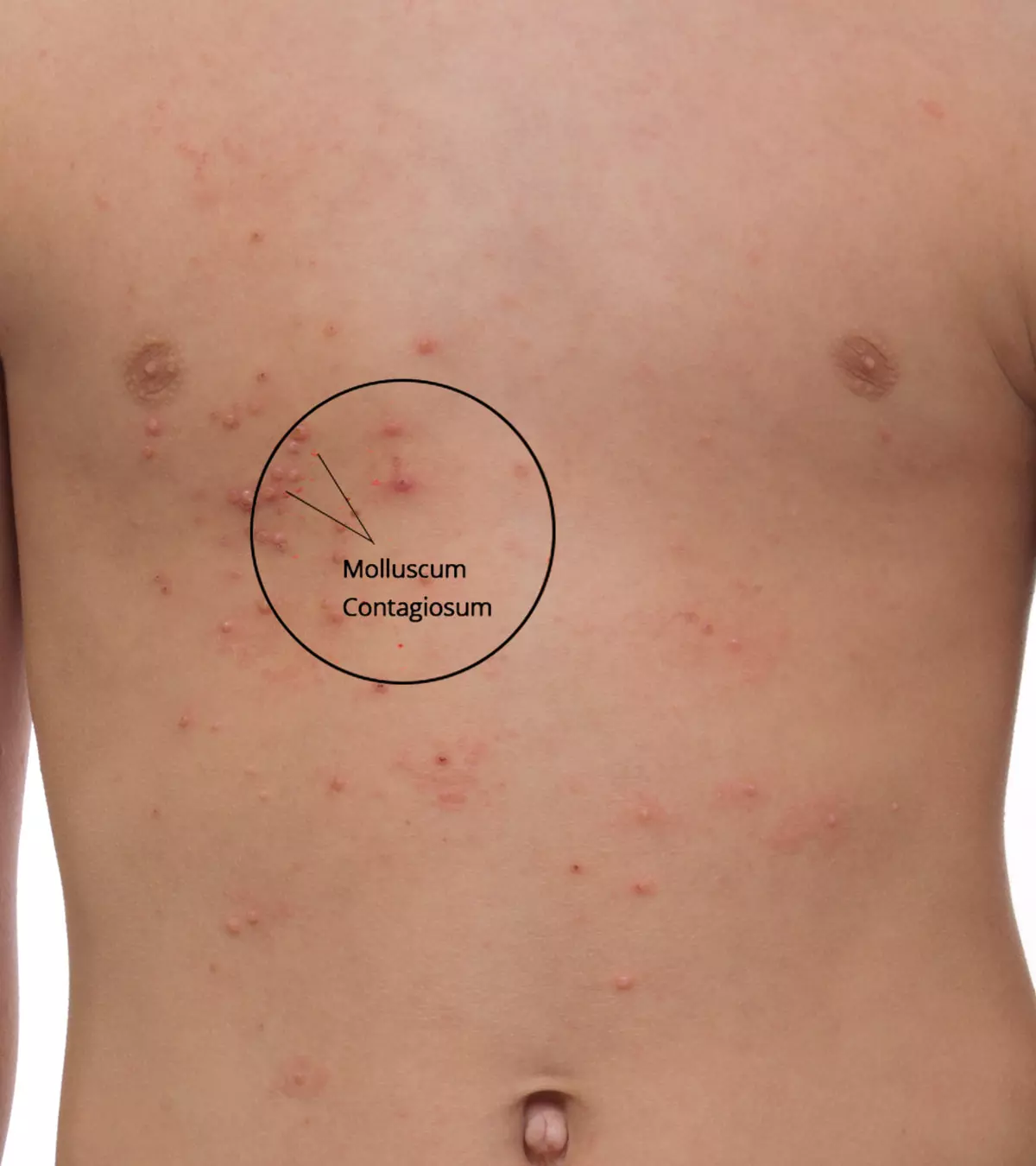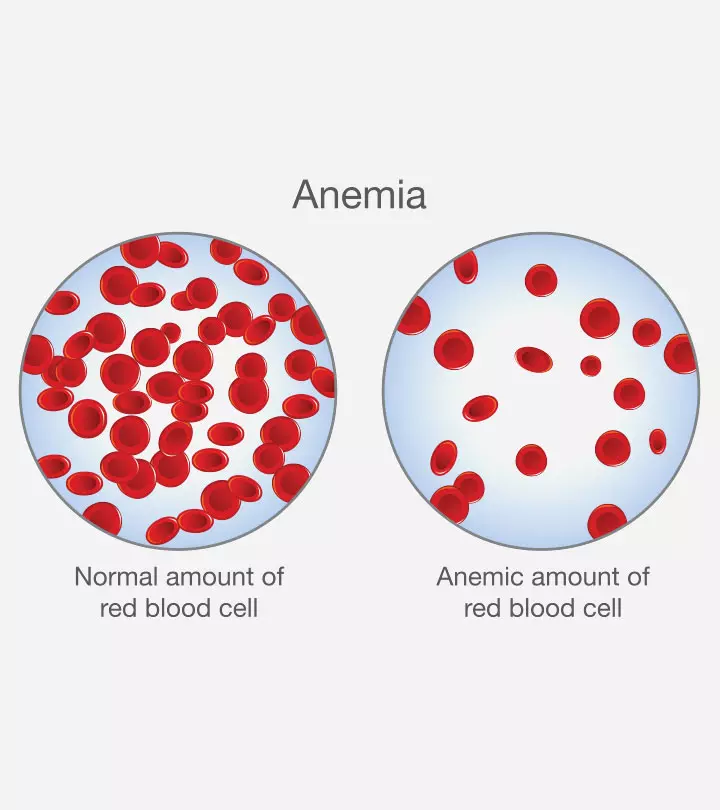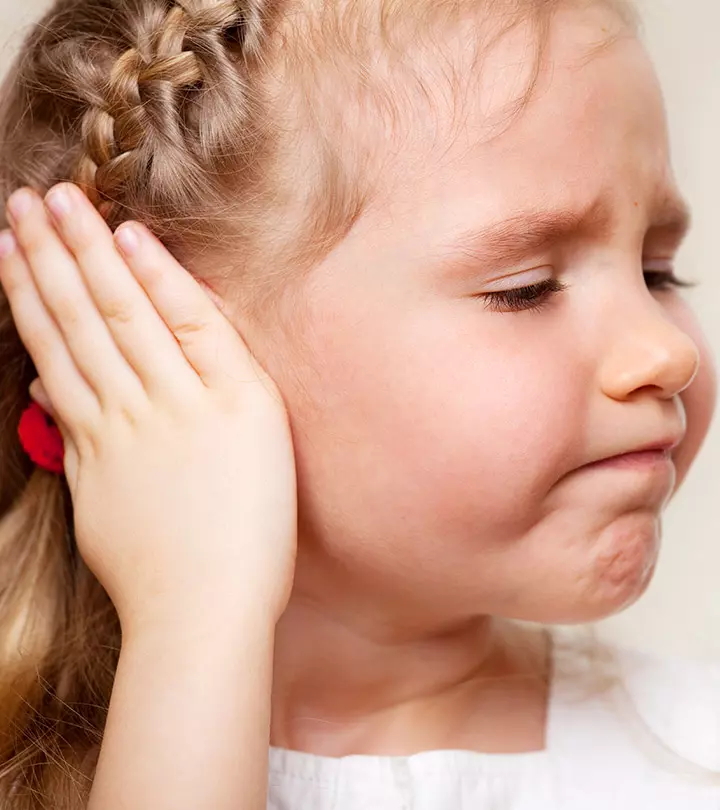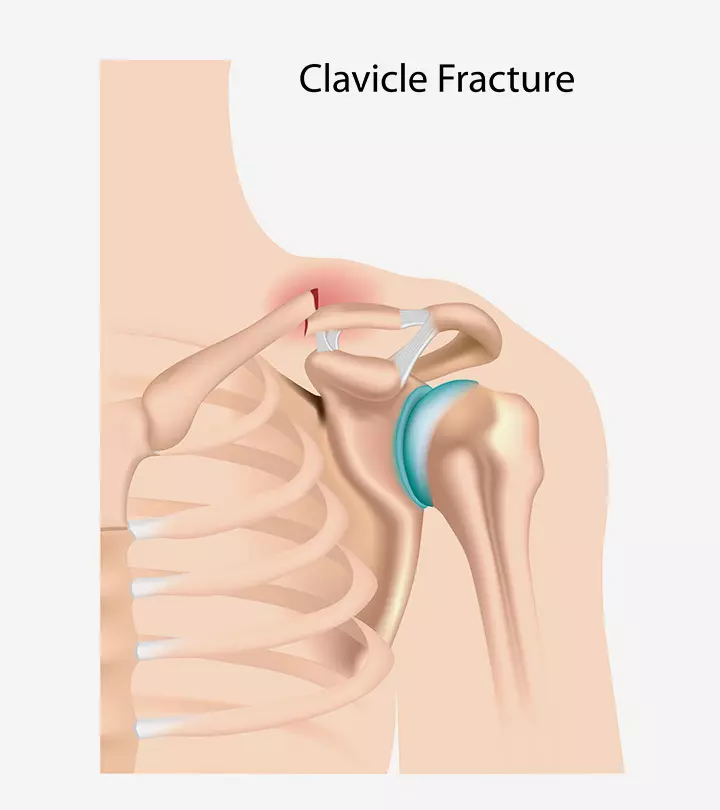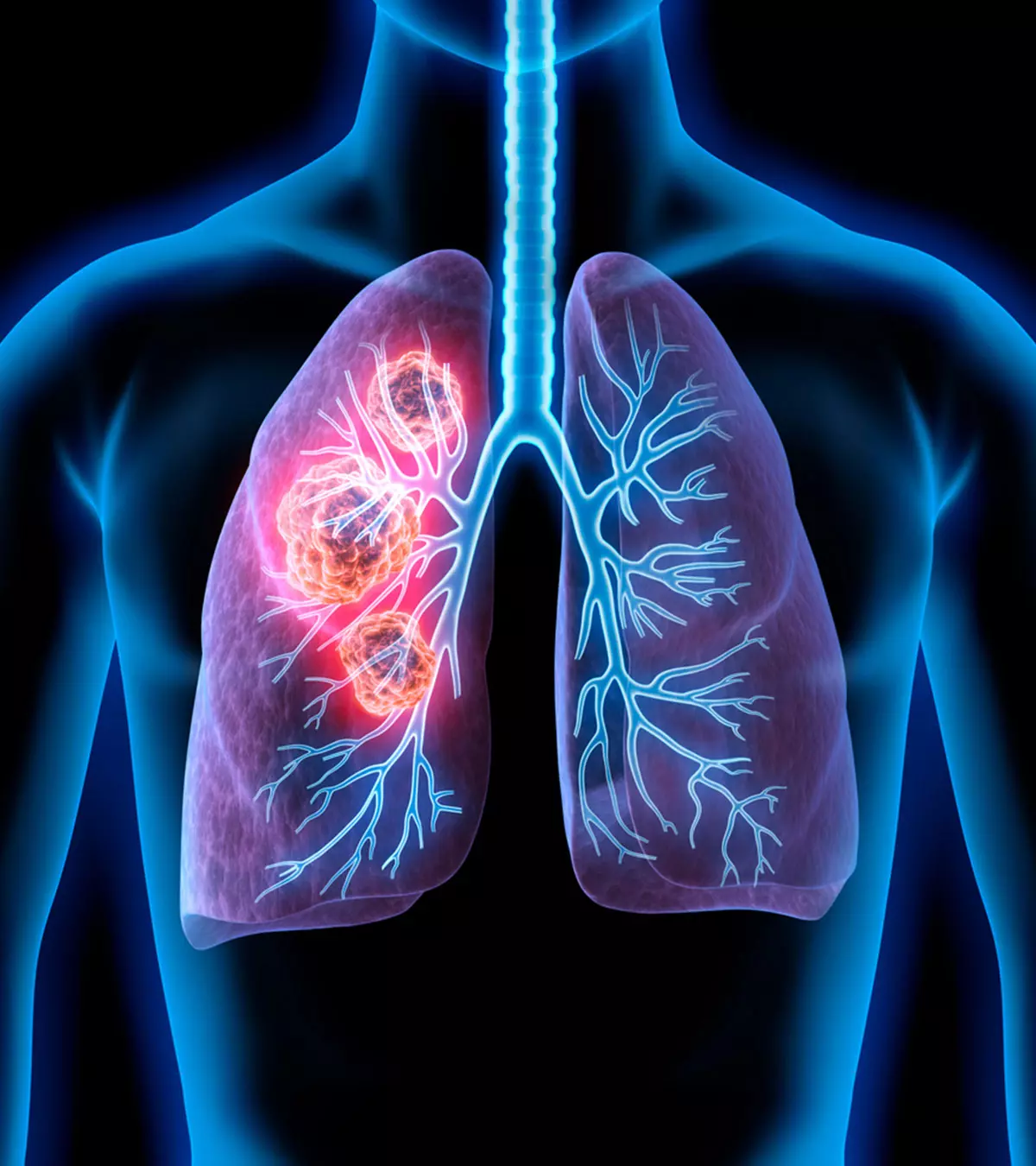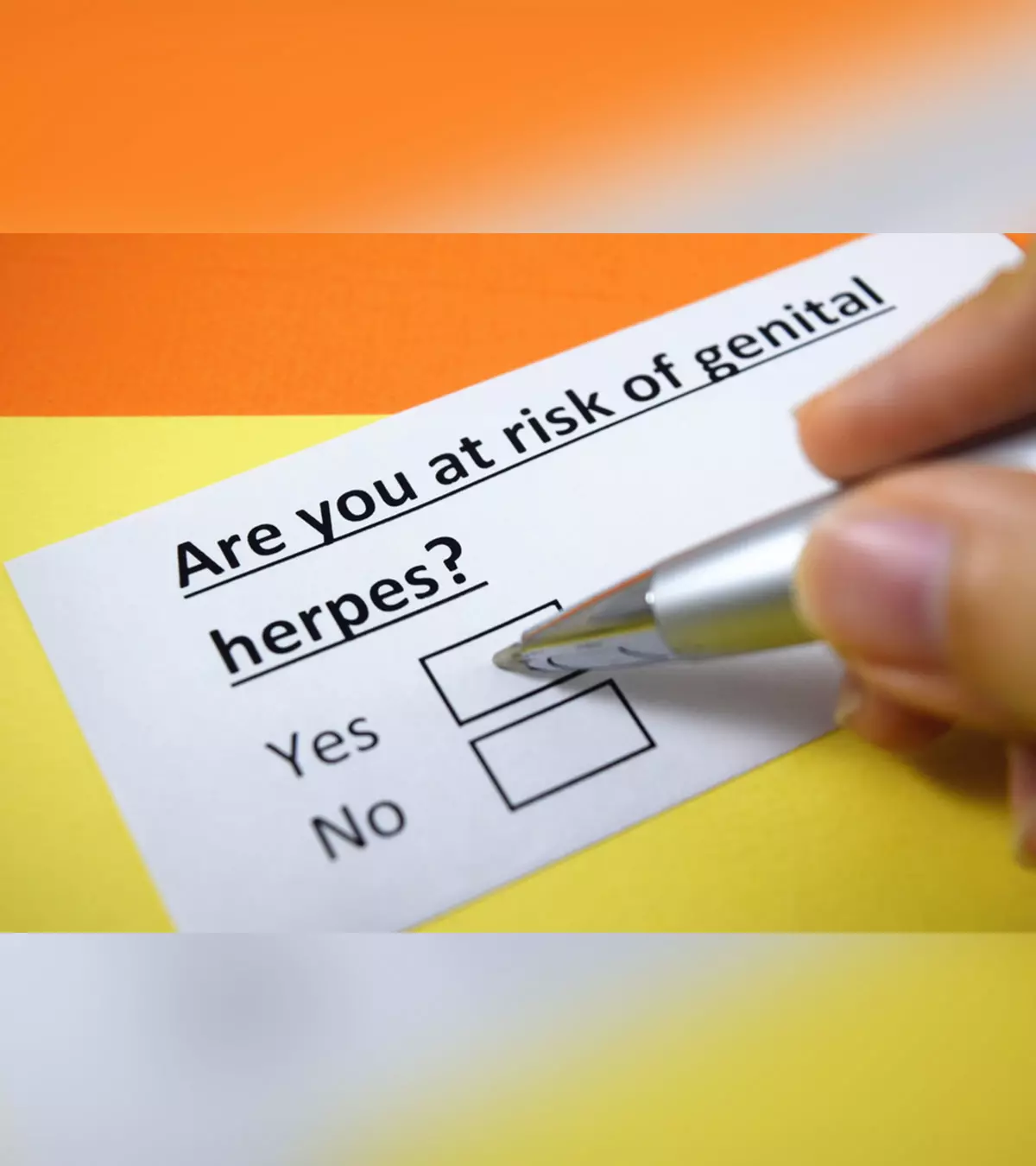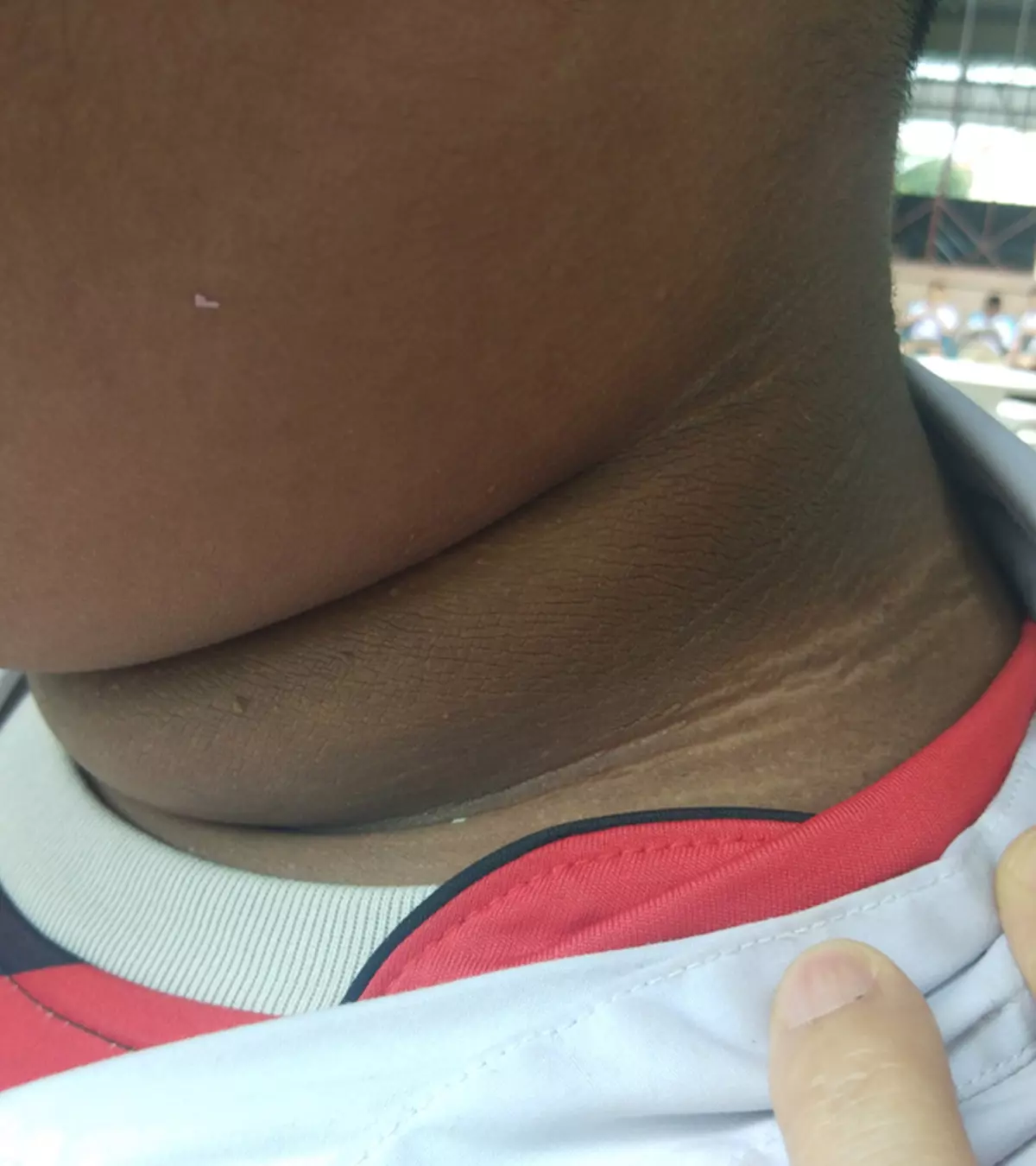
Passage of gas from the digestive tract is referred to as flatulence. Though it is normal in adults, flatulence (farting) in teens can leave them embarrassed and even amused. However, studies say that farting is a usual phenomenon. In fact, the average number of times an individual passes wind is five to 15 times in a day (1). Read this post to know about the foods, medications, and other factors that cause excessive farting in teens and how to deal with it.
Key Pointers
- The air swallowed with food or gases emerging from the digestive system could be released in the form of farts in teens.
- Certain foods and microbial composition of the digestive system might influence foul-smelling flatulence.
- Although flatulence is a common phenomenon, you need to seek medical attention if your teen experiences increased foul-smelling farts accompanied by other conditions such as blood in feces or diarrhea.
What Causes Farting?

The digestion of food can cause the formation of gases within the digestive tract. Also, a small amount of air is swallowed with food, water, or saliva. These gases are relieved from the digestive system through belching (burping) or flatulence (farting).
The following are the various reasons for flatulence in people, including teens (2) (3) (4).
- Swallowing excess air: One common cause of excessive farting is swallowing too much air. It happens when you eat quickly, don’t chew well, smoke, chew gum, or have habits like sucking on pens.
- Foods and drinks: Some veggies, fruits, grains, pulses, and dairy contain carbs that the body can’t fully digest. When these carbs reach the large intestine undigested, bacteria break them down through fermentation. This process releases gas directly or through interactions with other bacteria in the gut (5). Carbonated beverages are often associated with gas, but they are more likely to cause burping than flatulence.
- Medications: Some medicines can cause increased gas, bloating, or flatulence. For example, antibiotics can disrupt gut bacteria balance, leading to bloating. Similarly, pain relievers like ibuprofen may irritate the stomach lining, whereas statins might slow down digestion, leading to gas buildup (6).
- Health conditions: Constipation can cause the gas to get trapped in the intestines. Digestive disorders like irritable bowel syndrome (IBS) and celiac disease can affect gut movement, leading to poor digestion and increased gas production. Malabsorption disorders hinder proper nutrient absorption, leading to excess gas in the gut. Gastroenteritis and parasitic infections like giardiasis can also cause excessive gas due to inflammation and irritation of the digestive system (7).
Below is a table outlining the different factors that can cause flatulence in teenagers.
| Reasons For Farting In Teenagers | |
| Swallowing excess air |
|
| Foods and drinks |
|
| Medications |
|
| Health condition |
|
 Quick fact
Quick factIf your teen has flatulence due to medications, discuss with a pediatrician, who may prescribe alternative medicines.
What Makes Farts Smell?
The passed gas could sometimes have a bad smell due to the presence of sulfur compounds.
Foods high in sulfur, such as broccoli, cabbage, onion, and garlic, may lead to smelly flatulence. Bacteria in the digestive tract also produce gases during digestion. These gases could have sulfur compounds (6). The type of food eaten and the bacterial composition in the digestive tract can influence the smelliness of flatulence.
The sulfur compounds account for only 1% of gas, and the remaining is made of oxygen, nitrogen, hydrogen, carbon dioxide, and methane (9).
According to research, “Less than 1% of the intestinal gas (ammonia, skatole, hydrogen sulfide) is malodorous. The other gases (nitrogen, hydrogen, carbon dioxide, methane, oxygen) are odorless. The gases are produced by E. coli and other bacteria fermenting oligosaccharides that originate from milk products, bread, fruits, and vegetables, especially beans (10).” Hence, it is normal for gas to smell and is seldom a cause for concern.
 Did you know?
Did you know?When To See A Doctor?

Consult a general practitioner if your teen complains of increased farting and is frequently passing smelly gas. Visit a doctor if the teen has recurring episodes of any of the following signs or symptoms along with flatulence (9).
- Diarrhea
- Constipation
- Abdominal pain
- Bloating
- Bowel incontinence
- Blood in feces
- High fever
- Vomiting
- Chills
- Joint pain
- Muscle aches
These issues may indicate digestive or other health problems, and a doctor may order tests for an exact diagnosis.
 Point to consider
Point to considerHow To Avoid Excessive Farting?
The following changes in your teenager’s diet and lifestyle could help reduce excessive gas formation (11).
- Eat small portions meals frequently
- Chew food and drink slowly
- Avoid sugar-free chewing gums, candies, etc.
- Have regular physical activity
- Avoid gas-causing foods
- Sit up straight after eating to help digestion and prevent gas buildup
- If you wear dentures, ensure they fit correctly, as a poor fit can cause you to swallow excess air
- Consume beverages at room-temperature as they are easy to digest
- Manage stress and anxiety (12)
- Quit smoking
You may consider child-safe natural remedies or over-the-counter medications for flatulence after consulting your doctor. Herbs like fennel, peppermint tea, chamomile tea, anise, and spices such as turmeric, caraway, and coriander may help reduce gas buildup. If you prefer over-the-counter solutions, products like simethicone, activated charcoal, Pepto-Bismol, Lactase enzyme supplements, and Beano may aid the digestion of gas-producing foods (11). However, dietary or lifestyle factors can provide relief without medications. If farting persists and you are concerned, then see a doctor.
What Foods Reduce Farting In Teens?
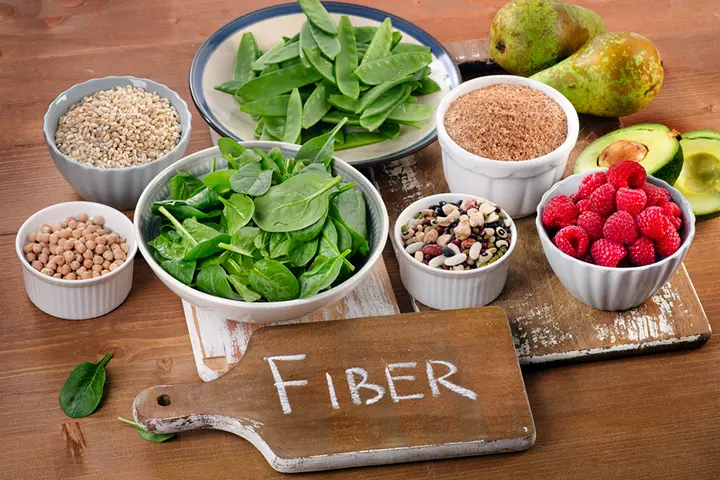
A healthy balanced diet with adequate fiber could help reduce excessive farting. Although fiber-rich foods may cause bloating in some teens, it is essential to eat about five portions of vegetables and fruits in a day.
Certain foods with easily digestible carbohydrates tend to produce less gas than others and can be natural and effective flatulence remedies. The inclusion of these foods may help provide the teen relief from excessive flatulence (13).
- Rice
- Potatoes and sweet potatoes
- Bananas
- Grapes
- Sugar-free yogurt
- Citrus fruits
- Gluten-free foods
- Leafy vegetables, such as spinach and lettuce
- Vegetables, such as tomatoes and zucchini
 Point to consider
Point to considerIt is not necessary that the same set of foods lead to flatulence commonly or provide relief. For instance, yogurt could ease gas in some teens but could worsen it in those with lactose intolerance. Therefore, you may ask your teen to note down the foods they have eaten on days when flatulence is more than normal. Next time, they may avoid or reduce the intake of such foods.
Frequently Asked Questions
1. How many times a day does the average teenager fart?
You may pass gas more than you think. It is normal to pass gas 14 to 23 times a day. Flatulence may occur throughout the day and often without notice. However, excessive flatulence with pain sensation requires medical attention (8).
2. Is farting normal for girls?
Flatulence can occur regardless of gender. It can be more related to your diet and overall digestive health.
3. Do I fart in my sleep?
It is normal for people to fart in their sleep and be unaware of it. The anal sphincter muscle can be more relaxed during sleep and spontaneously relaxed multiple times resulting in passing gas (14).
4. Is it healthy to fart?
Farting is healthy since the digestive process can make gas. Usually, gas from the gastrointestinal (GI) tract is released through burping or farting in healthy individuals. However, excessive farting, frequently passing smelly gas, or other associated gastrointestinal problems and symptoms may indicate underlying health conditions requiring medical care (8).
5. Do boys fart more than girls?
The farting frequency varies from one individual to another and is influenced by several factors, such as diet and gastrointestinal health. No conclusive studies could indicate that boys fart more than girls.
6. Is flatulence a disease?
No. Flatulence is not a disease. Instead, it is a normal physiological process that everyone experiences to some degree. Flatulence occurs due to the breakdown of food by bacteria in the gut and air swallowing while eating, drinking, or breathing. Generally, flatulence isn’t a cause for concern, but its excess may cause abdominal pain for teens, such as stomach pain, that might need medical intervention.
7. Does stress cause gas in teens?
The sensory nerves in the gastrointestinal system are connected to the sensory nerves in the brain. Therefore, stress can lead to gas in teens (15). Stress can also affect an individual’s eating habits, such as skipping meals or overeating, which can cause gas in some individuals. Hormonal changes due to stress could be another contributing factor to developing gas in teens.
8. Can drinking hot water alleviate digestive problems for my teen?
It is believed that drinking hot water helps promote digestion, which helps keep digestive issues, such as constipation, at bay. However, scientific evidence proving hot water’s role in digestion is sparse.
9. What are the psychological impacts of excessive farting on teens?
Excessive farting can sometimes lead to embarrassment or anxiety in teens, especially in social situations. This can affect their self-esteem and willingness to participate in group activities. It’s important for parents to support their teens and discuss these feelings openly.
Flatulence (farting) in teens isn’t uncommon. Swallowing of air while ingestion of food and water is a cause of flatulence in teens. If certain foods contain sulfur, the passed gas may have an unpleasant odor. If flatulence is a recurring issue in a teenager, consult your medical advisor. Report any accompanying symptoms such as diarrhea, bloody stools, or bowel incontinence to diagnose the cause properly. Alternatively, avoid foods that increase gas, chew food slowly, and maintain a healthy lifestyle.
Infographic: What Is The Treatment For Excessive Flatulence In Teens?
Occasional excessive intestinal gasses can be treated at home with home remedies and OTC medications. Persistent gasses require medical care and prescription medications, especially if unrelated to dietary factors. Go through the infographic to learn some common treatments for excessive flatulence in teens. Illustration: Momjunction Design Team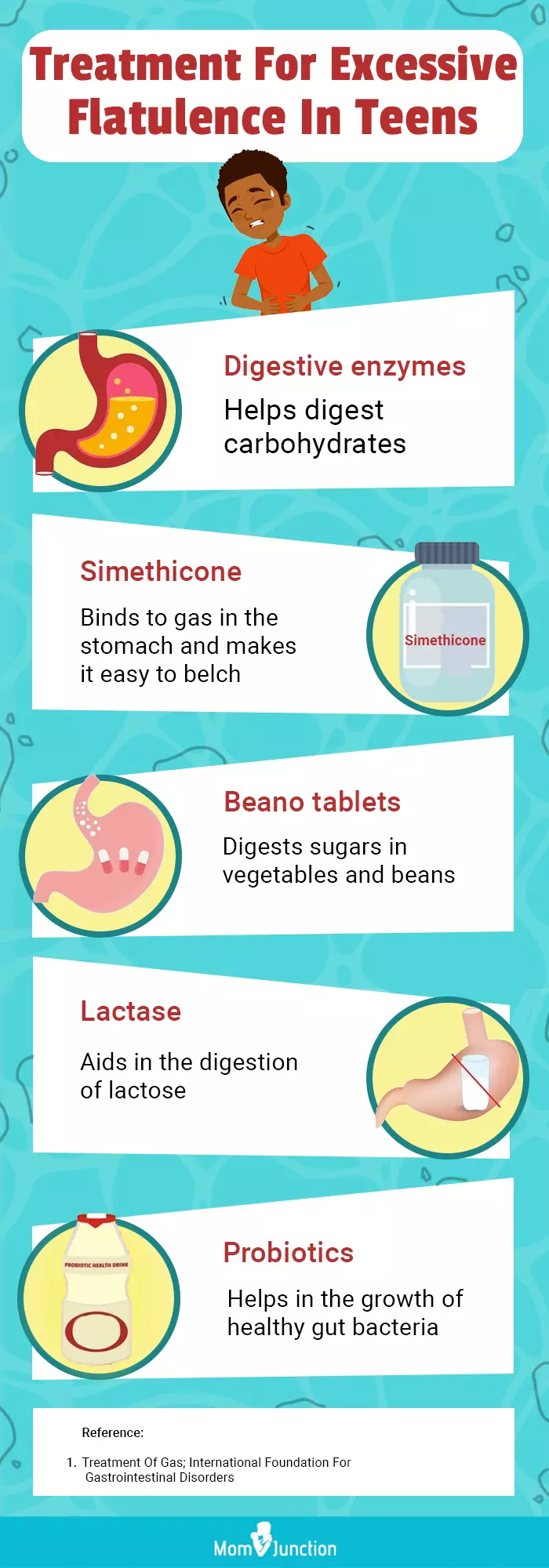
References
- Farting (flatulence).
https://www.nhs.uk/conditions/flatulence/ - Farting.
https://www.nhsinform.scot/illnesses-and-conditions/stomach-liver-and-gastrointestinal-tract/farting/ - Lawrence K Leung et al; (2011); Gastrointestinal adverse effects of varenicline at maintenance dose: a meta-analysis.
https://pmc.ncbi.nlm.nih.gov/articles/PMC3192741/ - About Giardia Infection.
https://www.cdc.gov/giardia/about/index.html - Erasme Mutuyemungu et al; (2023); Intestinal gas production by the gut microbiota: A review.
https://www.sciencedirect.com/science/article/pii/S1756464622004376 - 7 Types of Medication That Cause Bloating.
https://www.aarp.org/health/drugs-supplements/info-2023/medications-that-cause-bloating.html - Symptoms & Causes of Gas in the Digestive Tract.
https://www.niddk.nih.gov/health-information/digestive-diseases/gas-digestive-tract/symptoms-causes - Why Do I Keep Farting?
https://health.clevelandclinic.org/what-causes-flatulence-and-what-to-do-when-its-a-problem-for-you - Passing Gas: Different Smells and What They Mean.
https://www.unitypoint.org/news-and-articles/the-truth-about-gas - George Dunea; (2004); The gas we pass.
https://pmc.ncbi.nlm.nih.gov/articles/PMC523176/ - Gas: Beat The Bloat.
https://www.brighamandwomens.org/patients-and-families/meals-and-nutrition/bwh-nutrition-and-wellness-hub/special-topics/gas-beat-the-bloat - Can stress and anxiety cause stomach aches in kids?
https://www.childrens.com/health-wellness/stress-anxiety-and-stomach-aches-in-kids - Controlling Intestinal Gas.
https://iffgd.org/gi-disorders/symptoms-causes/intestinal-gas - Farting During Sleep: Causes and Tips for Reducing It.
https://www.sleepfoundation.org/physical-health/can-you-fart-in-your-sleep - What causes GI issues in teens – and how to get them to talk about it.
https://utswmed.org/medblog/what-causes-gi-issues-teens-and-how-get-them-talk-about-it/
Community Experiences
Join the conversation and become a part of our nurturing community! Share your stories, experiences, and insights to connect with fellow parents.
Read full bio of Dr. Pooja Parikh
Read full bio of Dr Bisny T. Joseph
Read full bio of Dr. Ritika Shah
Read full bio of Anindita Ghatak







